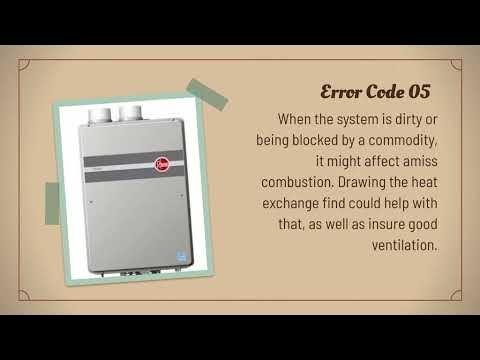
You see, modern water heaters like those from Rheem come equipped with a bunch of nifty features to keep them running safely and efficiently. One of these features is a leak detection system. It’s almost like having a tiny security guard inside your water heater that alerts you when there’s a potential leak. An error code “LE,” which stands for “Leak Error,” signals that this leak sensor has detected something suspicious. But before you start worrying about potential water damage, let’s delve into what this really means and how you can address it.
Understanding the Rheem Error Code LE
When your Rheem water heater displays the error code LE, it’s akin to your smoke alarm going off. It doesn’t necessarily mean there’s a fire—it just means you should check things out. The LE code specifically means the leak sensor has been activated. This might sound critical, but it’s often more of a precautionary alert.
The leak sensor in your water heater is designed to detect moisture in places it shouldn’t be. Think of it as a smoke detector for water. It’s a small, sensitive component that can pick up on moisture levels, ensuring that leaks don’t go unnoticed. When it senses moisture, it sends out the LE error code as a warning.
You might be wondering, “What causes this sensor to trigger?” There are a variety of reasons, and they might not all be as daunting as they sound. Sometimes it could be due to actual water leaks from the unit, but other times it might be triggered by high humidity or even condensation inside the water heater. These sensors are quite sensitive and are designed to err on the side of caution.
Common Causes of Error Code LE
Let’s explore some common causes of the LE error code. Actual water leakage is an obvious one, and if that’s the case, you might notice some water pooling around your water heater. This can happen due to a crack in the tank or leaks in the connections. It might sound alarming, but spotting it early can prevent bigger issues down the road.
Another common cause could be condensation. When you’ve got a tank full of hot water in a cooler environment, condensation can naturally form on the outside of the tank. This moisture might be interpreted by the sensor as a leak, even though it’s just harmless condensation. It’s similar to how a cold glass of iced tea will sweat on a hot day.
Lastly, high humidity in your utility room or basement where the water heater is located can trigger the sensor. If your home is particularly humid, this might be the culprit. It’s important to distinguish between these scenarios to address the problem effectively.
Steps to Resolve the Error Code LE
If your unit is flashing LE, here’s the deal: start by taking a close look around your water heater. Check for any obvious signs of water leakage. If you find water pooling or dripping, it might be time to call in a professional to fix any leaks. However, if you don’t see any signs of actual water leakage, it could be a false alarm.
Consider the environment. If it’s due to high humidity or condensation, improving the ventilation around your water heater might help. You can use a dehumidifier to lower the room’s humidity, or simply open a window if possible to allow air to circulate.
If you’ve checked these factors and the error persists, it might be a faulty sensor. In this case, contacting Rheem support or a professional technician to inspect and possibly replace the sensor is a wise choice. While it might cost a bit, it’s better to ensure your appliance is in safe working condition.
Preventative Measures and Maintenance Tips
After resolving the LE error code, maintaining your water heater is key to avoiding future alerts. Regular maintenance can help keep your water heater in top shape, much like taking your car in for routine oil changes to prevent engine issues.
Ensure you periodically inspect the area around your water heater for any signs of leaks, corrosion, or rust. Just like checking for drips in a faucet to avoid a water bill surprise, keeping an eye on your heater can save headaches later on.
If humidity is an issue, consider investing in a hygrometer to monitor moisture levels in your utility area. A dehumidifier could also be a long-term solution to keep both your water heater and other household appliances safe from moisture-induced issues.
Routine professional check-ups can also extend the lifespan of your water heater. A technician can spot potential problems before they escalate, offering peace of mind knowing your heater is operating efficiently and safely.
By understanding what the LE code means and taking preventive steps, you can ensure your Rheem water heater continues to provide hot water on demand, without any unexpected icy showers!